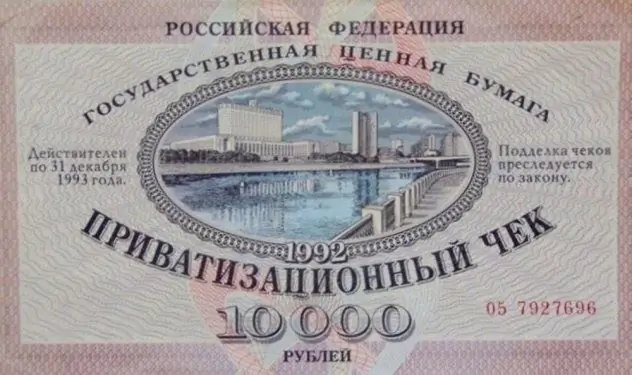- Author Nora Macey macey@family-relation.com.
- Public 2023-12-16 10:17.
- Last modified 2025-01-23 08:47.
The attitude to the memorable vouchers, or privatization checks, which were handed out for free to the entire population of Russia back in 1993, is still ambiguous. Someone supported this idea, and someone was even an ardent opponent of these actions.

The vast majority of people treat the very idea of vouchers, and especially the consequences of their distribution, as a scam, thanks to which enterprising businessmen acquired tidbits of public property for a pittance. Some, on the contrary, are satisfied, because they did not give their vouchers for a pittance, did not invest them in voucher investment funds, but thought of exchanging them for shares of large state-owned companies, and made the right decision. For example, shares of the same “Gazprom” have been quoted for a long time, and they can be sold profitably at any time.
But, of course, the number of such lucky ones is relatively small - after all, then for the citizens of the former USSR, all these things and concepts were a wonder. They had the most distant idea of both the laws of the market and the peculiarities of market relations (especially in the era of "wild capitalism"). In addition, trust in the media was still very strongly developed at that time. From the pages of newspapers and from TV screens there were calls to invest vouchers, for example, in some kind of CHIF, or in a structure promising quick and reliable profits (like the same unforgettable “MMM”) - people believed and invested. And they did not even think that everything might not be so rosy at all. Disappointment came later.
So what can a former voucher holder rely on now? If, for example, that private equity fund, in which his privatization checks were invested, has not yet gone bankrupt and has not disappeared without a trace (there were plenty of such cases), but continues to operate, then you can receive dividends. Alas, their value in 99% of cases is simply ridiculous, and going to court is useless - everything is according to the law, you can't find fault.
In cases where, in addition to vouchers, people have invested their personal funds, you can get back up to 10 thousand rubles. Unfortunately, this is the maximum amount of compensation you can count on. It can be obtained by former shareholders of those bankrupt companies, the list of which has been approved by the relevant state structures (information can be obtained from the Federal Fund for the Protection of the Rights of Shareholders and Investors). But, given the small amount of compensation, people are unlikely to want to do this, wasting time and nerves.
If the vouchers were invested in a company that is still operating, the investor should contact there for advice. By law, each enterprise must have a structure dealing with work with its shareholders (a department or an authorized person, if the enterprise is small). Of course, in the overwhelming majority of cases, the payments will be more than modest, but it's still better than nothing.

